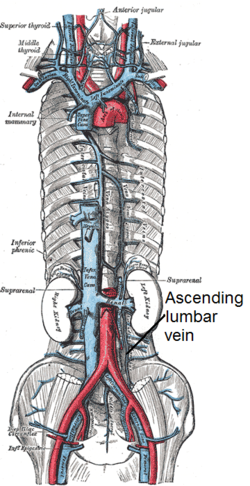The ascending lumbar vein is a vein that runs up through the lumbar region on the side of the vertebral column.
| Ascending lumbar vein | |
|---|---|
 The venae cavae and azygos veins with their tributaries. | |
| Details | |
| Drains from | Lateral sacral veins |
| Drains to | Azygos vein and hemiazygos vein |
| Identifiers | |
| Latin | vena lumbalis ascendens |
| TA98 | A12.3.07.011 A12.3.09.004 |
| TA2 | 4757, 4771 |
| FMA | 12858 |
| Anatomical terminology | |
Structure
editThe ascending lumbar vein is a paired structure (i.e. one each for the right and left sides of the body). It starts at the common iliac veins.[1] It runs superiorly, intersecting with the lumbar veins as it crosses them.[1] It passes behind the psoas major muscle, but in front of the lumbar vertebrae.[1]
When the ascending lumbar vein crosses the subcostal vein, it becomes one of the following:
- the azygos vein (in the case of the right ascending lumbar vein).[1][2]
- the hemiazygos vein (in the case of the left ascending lumbar vein).[1]
- The first and second lumbar veins ends in the ascending lumbar vein(the third and fourth lumbar veins open into the posterior aspect of the inferior vena cava)
Clinical significance
editContrast medium may be injected into the ascending lumbar vein via the femoral vein in order to visualise the spinal canal.[3]
The ascending lumbar vein may be punctured during catheterisation.[4] This can cause bleeding into the dural space.[4]
References
edit- ^ a b c d e Chiva, Luis M.; Magrina, Javier (2018-01-01), Ramirez, Pedro T.; Frumovitz, Michael; Abu-Rustum, Nadeem R. (eds.), "Chapter 2 - Abdominal and Pelvic Anatomy", Principles of Gynecologic Oncology Surgery, Elsevier, pp. 3–49, doi:10.1016/b978-0-323-42878-1.00002-x, ISBN 978-0-323-42878-1, retrieved 2020-11-23
- ^ Roshan, John; Mears, Jennifer A.; Lachman, Nirusha; Christensen, Kevin; Ladewig, Dorothy J.; Asirvatham, Samuel J. (2011-01-01), Bredikis, Audrius J.; Wilber, David J. (eds.), "Chapter 17 - Role of Cryoablation for Superior Vena Cava Isolation and Ablation of Inappropriate Sinus Tachycardia", Cryoablation of Cardiac Arrhythmias, Saint Louis: W.B. Saunders, pp. 191–203, doi:10.1016/b978-1-4377-1615-3.00017-4, ISBN 978-1-4377-1615-3, retrieved 2020-11-23
- ^ Hawkes, C H; Roberts, G M (1984-01-01), Harrison, M. J. G. (ed.), "Chapter 60 - Lumbar canal stenosis", Contemporary Neurology, Butterworth-Heinemann, pp. 564–574, doi:10.1016/b978-0-407-00308-8.50064-1, ISBN 978-0-407-00308-8, S2CID 8133431, retrieved 2021-01-30
- ^ a b Harbert, Mary J.; Pardo, Andrea C. (2017-01-01), Swaiman, Kenneth F.; Ashwal, Stephen; Ferriero, Donna M.; Schor, Nina F. (eds.), "21 - Neonatal Nervous System Trauma", Swaiman's Pediatric Neurology (Sixth Edition), Elsevier, pp. 156–160, doi:10.1016/b978-0-323-37101-8.00021-7, ISBN 978-0-323-37101-8, retrieved 2021-01-30
External links
edit- thoraxlesson5 at The Anatomy Lesson by Wesley Norman (Georgetown University) (postmediastinumlevel5)
- figures/chapter_29/29-4.HTM: Basic Human Anatomy at Dartmouth Medical School